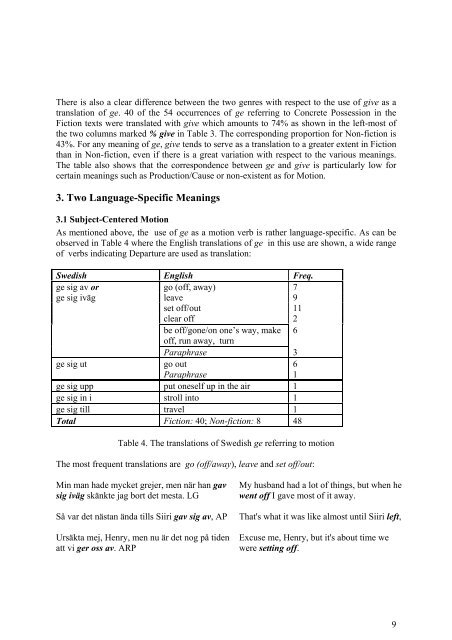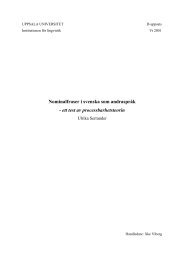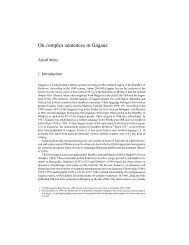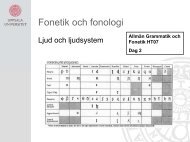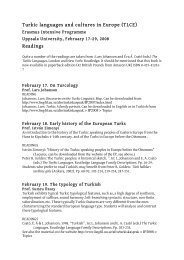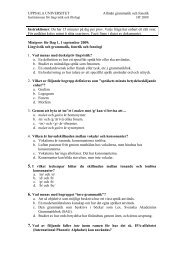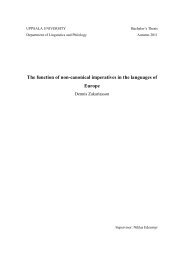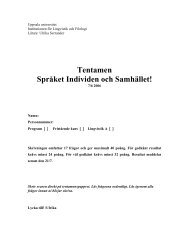The polysemy of Swedish ge 'give'
The polysemy of Swedish ge 'give'
The polysemy of Swedish ge 'give'
Create successful ePaper yourself
Turn your PDF publications into a flip-book with our unique Google optimized e-Paper software.
<strong>The</strong>re is also a clear difference between the two <strong>ge</strong>nres with respect to the use <strong>of</strong> give as a<br />
translation <strong>of</strong> <strong>ge</strong>. 40 <strong>of</strong> the 54 occurrences <strong>of</strong> <strong>ge</strong> referring to Concrete Possession in the<br />
Fiction texts were translated with give which amounts to 74% as shown in the left-most <strong>of</strong><br />
the two columns marked % give in Table 3. <strong>The</strong> corresponding proportion for Non-fiction is<br />
43%. For any meaning <strong>of</strong> <strong>ge</strong>, give tends to serve as a translation to a greater extent in Fiction<br />
than in Non-fiction, even if there is a great variation with respect to the various meanings.<br />
<strong>The</strong> table also shows that the correspondence between <strong>ge</strong> and give is particularly low for<br />
certain meanings such as Production/Cause or non-existent as for Motion.<br />
3. Two Langua<strong>ge</strong>-Specific Meanings<br />
3.1 Subject-Centered Motion<br />
As mentioned above, the use <strong>of</strong> <strong>ge</strong> as a motion verb is rather langua<strong>ge</strong>-specific. As can be<br />
observed in Table 4 where the English translations <strong>of</strong> <strong>ge</strong> in this use are shown, a wide ran<strong>ge</strong><br />
<strong>of</strong> verbs indicating Departure are used as translation:<br />
<strong>Swedish</strong> English Freq.<br />
<strong>ge</strong> sig av or go (<strong>of</strong>f, away) 7<br />
<strong>ge</strong> sig iväg leave 9<br />
set <strong>of</strong>f/out 11<br />
clear <strong>of</strong>f 2<br />
be <strong>of</strong>f/gone/on one’s way, make 6<br />
<strong>of</strong>f, run away, turn<br />
Paraphrase 3<br />
<strong>ge</strong> sig ut<br />
go out<br />
Paraphrase<br />
6<br />
1<br />
<strong>ge</strong> sig upp put oneself up in the air 1<br />
<strong>ge</strong> sig in i stroll into 1<br />
<strong>ge</strong> sig till travel 1<br />
Total Fiction: 40; Non-fiction: 8 48<br />
Table 4. <strong>The</strong> translations <strong>of</strong> <strong>Swedish</strong> <strong>ge</strong> referring to motion<br />
<strong>The</strong> most frequent translations are go (<strong>of</strong>f/away), leave and set <strong>of</strong>f/out:<br />
Min man hade mycket grejer, men när han gav<br />
sig iväg skänkte jag bort det mesta. LG<br />
Så var det nästan ända tills Siiri gav sig av, AP<br />
Ursäkta mej, Henry, men nu är det nog på tiden<br />
att vi <strong>ge</strong>r oss av. ARP<br />
My husband had a lot <strong>of</strong> things, but when he<br />
went <strong>of</strong>f I gave most <strong>of</strong> it away.<br />
That's what it was like almost until Siiri left,<br />
Excuse me, Henry, but it's about time we<br />
were setting <strong>of</strong>f.<br />
9


